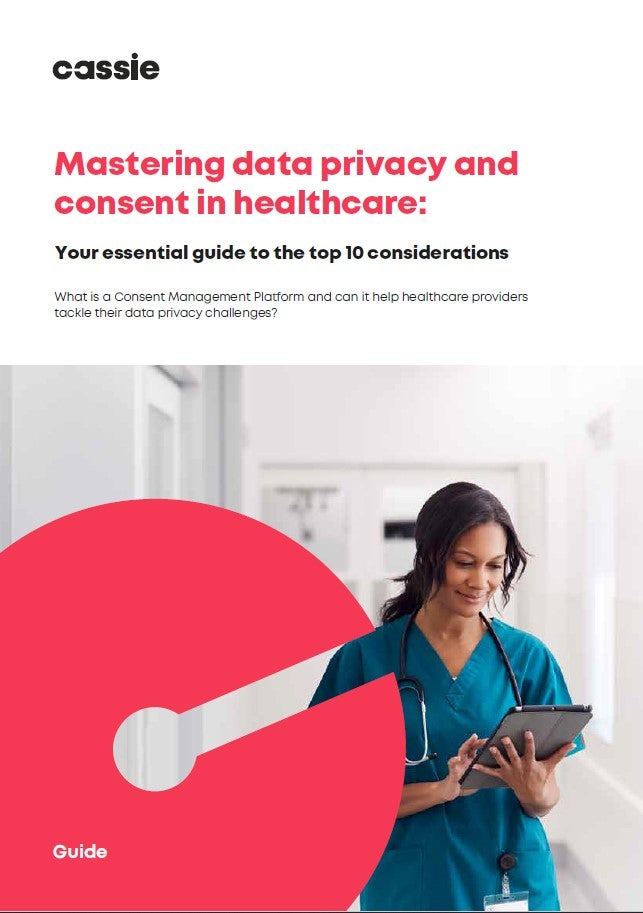The challenges of clinical data management: Can consent management software help?
David McInerney, Cassie Commercial Manager, explains clinical data management challenges in a modern world, including the all-important role of consent and preference management platforms in streamlining and centralising data management.

Clinical data management (CDM) is one of the most critical aspects of clinical research. Trial data must be accurate to yield useful results, therefore it is crucial that sponsors ensure the data they collect is of the highest quality.
Effective data management requires precise tracking, storage, and analysis of large amounts of patient information, says David McInerney, Commercial Manager at Cassie – and therein lies the challenge. “It can be difficult when dealing with multiple sources of data across different vendors and platforms. Trial data is often vast and complex, and this can also make it difficult for healthcare providers to analyse the information in meaningful ways,” he explains.
At all times, compliance stays top of mind. “Sponsors must ensure that their processes for collecting, storing, and analysing their data meet all relevant regulations and standards, and they also need to take steps to secure sensitive patient data and prevent unauthorised access,” notes McInerney. “This means having proper security protocols and data encryption methods in place.”
As new approaches to trial design enter the scene, McInerney believes the complexity of CDM is increasing. “Modern trial designs often require real-time data modelling and adaptive designs, which allow for changes in drug dosage, for example. These complexities pose challenges for CDM systems, as they must now facilitate efficient decision-making,” he explains.
The wealth of data collected from the growing number of digital tools used to facilitate decentralised clinical trials adds to the challenge. The implications all this can have on consent management must be tackled carefully.
Tracking consent across the patient journey
Consent is an integral part of clinical research, but as new approaches are integrated into research models, the number of trial components requiring consent is growing.
In an online world, patients may learn about studies through consent-driven digital marketing strategies such as cookies and questionnaires. Should the patient decide to take part, they might consent to electronic screening, where their electronic health records are compared against the trial’s criteria. During the onboarding process, informed consent is obtained and the patient’s preferences concerning the kinds of data that can be collected and with whom that data can be shared are recorded.
Throughout the process, patients should feel they can trust the healthcare company with their personal data. For the sponsor, achieving a single view of the patient across this journey while maintaining compliance to local regulations is essential.
The role of consent and preference management
Faced with this challenge, it’s easy to see why consent and preference management platforms (CMP) have become invaluable tools. Such systems provide a centralised space for managing all trial data, helping sponsors ensure data is recorded accurately and securely.
CMP platforms also improve the trial experience by allowing patients to actively engage in their own consent choices, believes McInerney. “Participants can view their records online or via an app. It gives them the latest information on their health status, as well as the ability to update their consent and preferences. This can empower patients and give them greater control over their clinical trial experience.”
At the same time, consent management platforms allow sponsors to comply with data privacy regulations and guidelines like HIPAA and Washington’s My Health, My Data, ensuring patient safety remains at the forefront of all processes while avoiding litigation.
Trust Cassie
Cassie is a leading CMP that manages over 1.2 billion customer records for large organisations handling high-volume, complex data. During clinical research, Cassie collects consents across any touchpoint in compliance with specific health data protection laws. Patients can exercise their rights to privacy at any time through a Data Subject Access Request (DSAR), with the DSAR module enabling sponsors to track, review, reopen, and approve requests.
When it comes to compliance, the software has “global adaptability” – a key advantage for sponsors with trials spanning multiple jurisdictions. “The software is built for flexible configuration, meaning it’s future proof for legislative changes or updates so that you’re always in line with data protection laws, even in the most complex technical environments,” explains McInerney.
With over 350 prebuilt API integrations across core systems like CRMs, EHRs, and patient portals, Cassie delivers a centralised source of truth, providing participants, caregivers and practitioners a single view of the patient’s data. This also facilitates an ironclad audit trail showing a full history of the steps taken to achieve compliance.
“Granular patient data can be shared securely with anyone that needs access across organisational, geographical, and technological boundaries in line with their consent preferences and the relevant legislation,” adds McInerney.
“Global healthcare clients rely on real-time, granular relay of data between multiple data sources. With Cassie’s Connector Service, sponsors can honour and enforce consent data across all downstream platforms, at high volume, in real-time. Cassie becomes the centralised source of truth – the pulse of your organization – providing granular consent insights as well as saving teams from the hassles of manual push-throughs of data that are vulnerable to error and delay.”
To learn more about the importance of managing patient data correctly, download the whitepaper below.
In this whitepaper, you will learn:
- How to maintain patient trust
- How to ensure data protection
- The challenges the healthcare sector faces around data privacy
- How Consent Management Platforms can help clinical sponsors achieve their goals
What's Your Reaction?


































